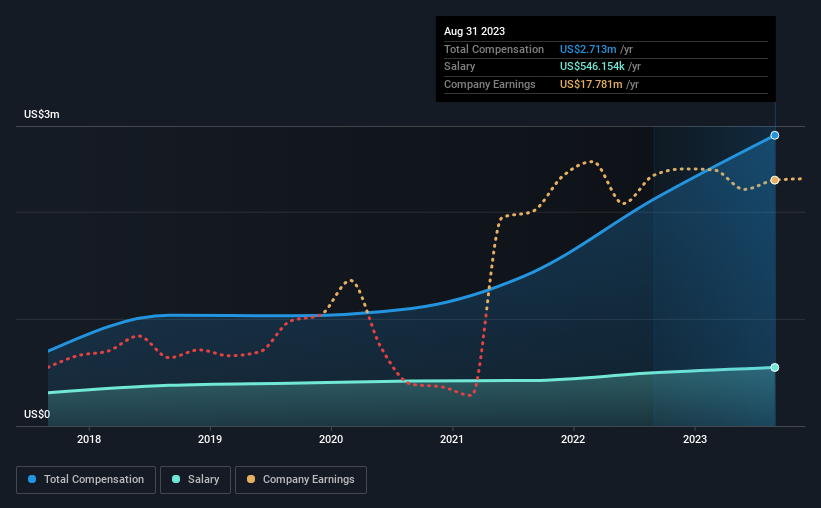Shareholders Would Not Be Objecting To Franklin Covey Co.'s (NYSE:FC) CEO Compensation And Here's Why
Key Insights
Franklin Covey to hold its Annual General Meeting on 19th of January
CEO Paul Walker's total compensation includes salary of US$546.2k
The overall pay is comparable to the industry average
Franklin Covey's EPS grew by 48% over the past three years while total shareholder return over the past three years was 65%
We have been pretty impressed with the performance at Franklin Covey Co. (NYSE:FC) recently and CEO Paul Walker deserves a mention for their role in it. The pleasing results would be something shareholders would keep in mind at the upcoming AGM on 19th of January. It is likely that the focus will be on company strategy going forward as shareholders hear from the board and cast their votes on resolutions such as executive remuneration and other matters. Here is our take on why we think CEO compensation is not extravagant.
Check out our latest analysis for Franklin Covey
Comparing Franklin Covey Co.'s CEO Compensation With The Industry
Our data indicates that Franklin Covey Co. has a market capitalization of US$546m, and total annual CEO compensation was reported as US$2.7m for the year to August 2023. That's a notable increase of 28% on last year. While this analysis focuses on total compensation, it's worth acknowledging that the salary portion is lower, valued at US$546k.
For comparison, other companies in the American Professional Services industry with market capitalizations ranging between US$200m and US$800m had a median total CEO compensation of US$2.9m. From this we gather that Paul Walker is paid around the median for CEOs in the industry. What's more, Paul Walker holds US$2.3m worth of shares in the company in their own name, indicating that they have a lot of skin in the game.
Component | 2023 | 2022 | Proportion (2023) |
Salary | US$546k | US$497k | 20% |
Other | US$2.2m | US$1.6m | 80% |
Total Compensation | US$2.7m | US$2.1m | 100% |
On an industry level, around 14% of total compensation represents salary and 86% is other remuneration. According to our research, Franklin Covey has allocated a higher percentage of pay to salary in comparison to the wider industry. If non-salary compensation dominates total pay, it's an indicator that the executive's salary is tied to company performance.
Franklin Covey Co.'s Growth
Franklin Covey Co.'s earnings per share (EPS) grew 48% per year over the last three years. Its revenue is up 3.2% over the last year.
Shareholders would be glad to know that the company has improved itself over the last few years. It's also good to see modest revenue growth, suggesting the underlying business is healthy. Looking ahead, you might want to check this free visual report on analyst forecasts for the company's future earnings..
Has Franklin Covey Co. Been A Good Investment?
Boasting a total shareholder return of 65% over three years, Franklin Covey Co. has done well by shareholders. As a result, some may believe the CEO should be paid more than is normal for companies of similar size.
In Summary...
The company's solid performance might have made most shareholders happy, possibly making CEO remuneration the least of the matters to be discussed in the AGM. Instead, investors might be more interested in discussions that would help manage their longer-term growth expectations such as company business strategies and future growth potential.
Whatever your view on compensation, you might want to check if insiders are buying or selling Franklin Covey shares (free trial).
Of course, you might find a fantastic investment by looking at a different set of stocks. So take a peek at this free list of interesting companies.
Have feedback on this article? Concerned about the content? Get in touch with us directly. Alternatively, email editorial-team (at) simplywallst.com.
This article by Simply Wall St is general in nature. We provide commentary based on historical data and analyst forecasts only using an unbiased methodology and our articles are not intended to be financial advice. It does not constitute a recommendation to buy or sell any stock, and does not take account of your objectives, or your financial situation. We aim to bring you long-term focused analysis driven by fundamental data. Note that our analysis may not factor in the latest price-sensitive company announcements or qualitative material. Simply Wall St has no position in any stocks mentioned.

